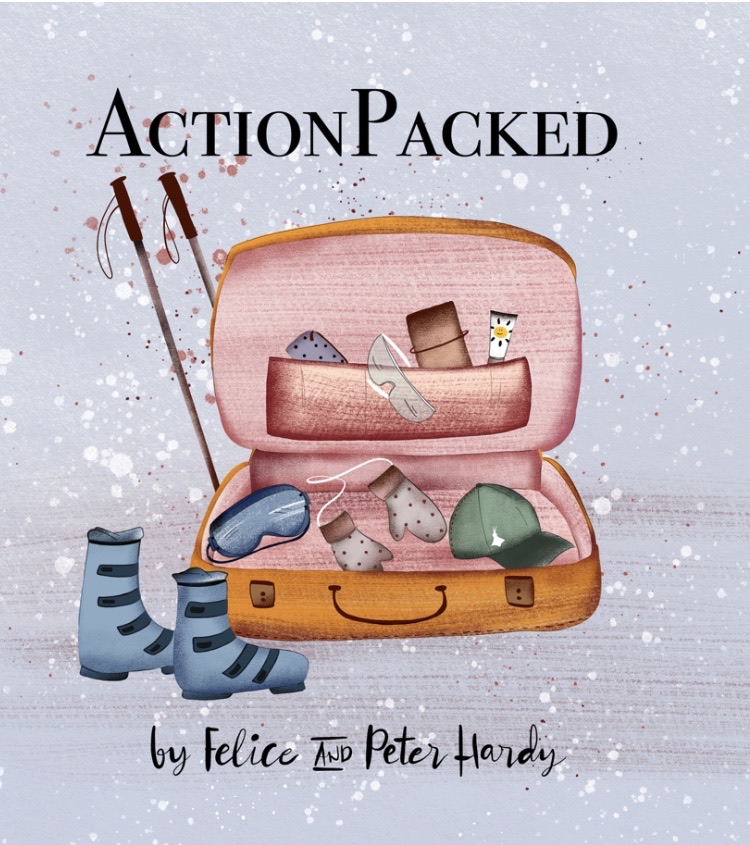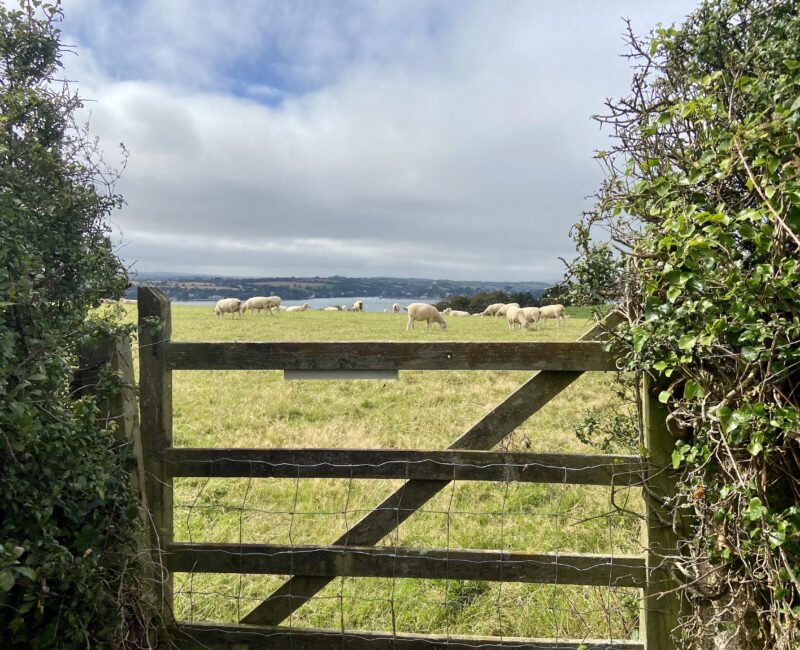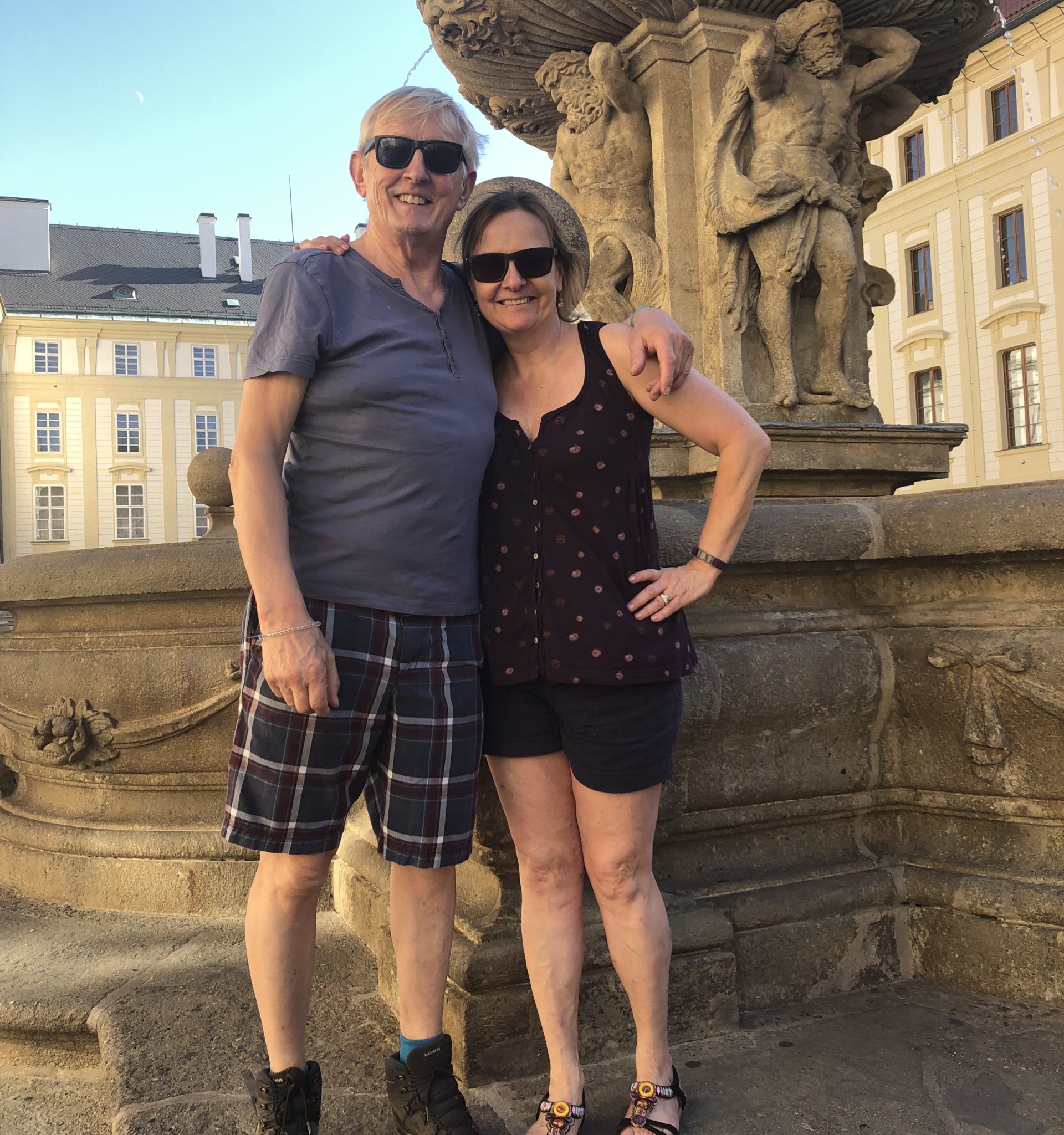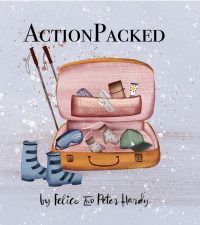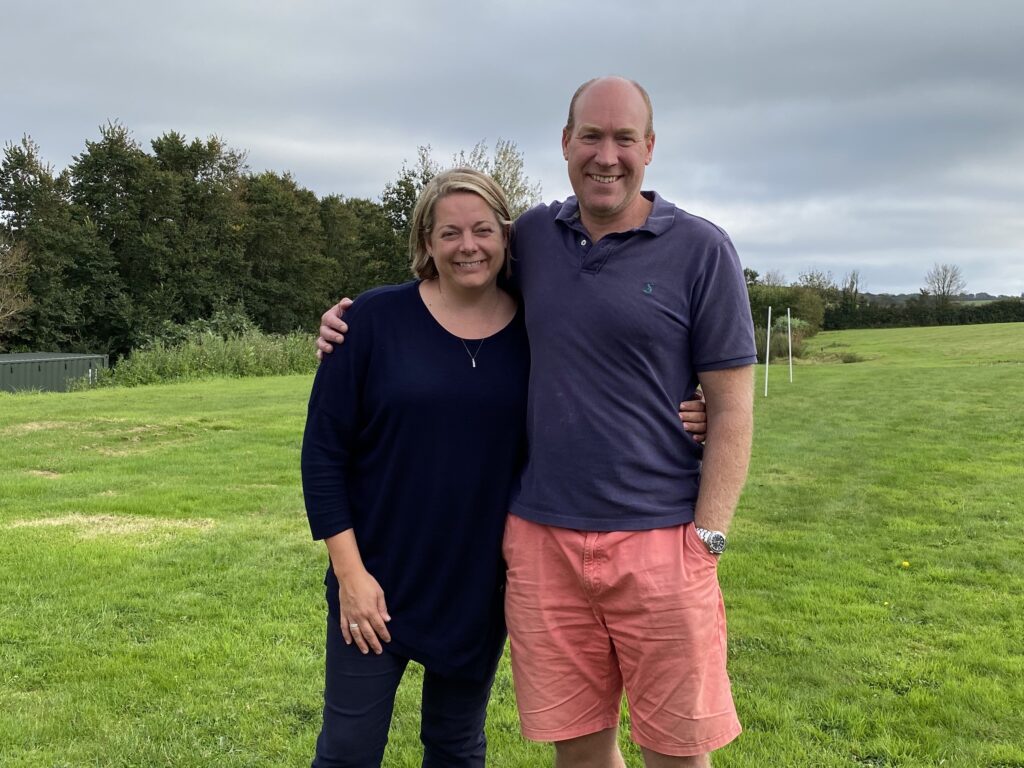
Sarah and Michael. Photo: © F.Hardy.
Peter Welcome to our travel podcast. For all of us in 2020, the world has been turned upside down and it’s not, frankly, ever going to right itself in any way familiar to what went before. It’s been and is a time to re-evaluate our jobs, our lives and our relationships with others, our expectations of the future. For those in the top of the financial tree, there’s further to fall. It really doesn’t matter whether you live in London, New York, San Francisco, Singapore or Sydney. The spotlight that falls on the daily corporate grind and in many cases is found wanting. I mean, do I really want…do I really need…to continue doing day after day what I’m doing now, in the light of a world that’s changing beyond all recognition?
Getting home, whether exhausted or exhilarated at 10pm and leaving for work again in the hour before dawn suddenly seems pointless. Sure, the money is good, but what’s the point of the money if there’s little or no down time in which to enjoy it? No quality to family life when you and your partner are ships that pass in an unsatisfactory night. You’re missing out or are unaware of those pivotal moments in your children’s lives. Now, Michael and Sarah met in the schoolyard and have been inseparable ever since. Both were earning high city salaries as they juggled careers and bringing up four children under seven.
Months before Covid crept uninvited their lives, they decided to jump. It was far from being a case of before they were pushed. They made the decision to give it all up in the hope of finding something better. They were, as it turned out, one major step ahead of the game. One day on the road to Manchester rather than Damascus, they saw the blinding light. So what if we cashed in the house and all the urban trappings of success? What if we were to swap it all for self-sufficiency in the rural idyl, a bit like Tom and Barbara in the 1970s BBC sitcom The Good Life? Could we really have a go at that? You know, sometimes if you have the courage to press the red start button, life takes on an unstoppable forward momentum all of its own.
The following day they put their house on the market. Four days later, much to their surprise, it sold. Now, The Roseland peninsula on the south coast of West Cornwall is a stunningly beautiful but remote place of winding, narrow lanes that finally lead to ancient villages and remarkable beaches and seascapes as the English Channel gives way to the stormy might of the Atlantic Ocean. Two years later, we went to find out how Sarah and Michael are getting on.
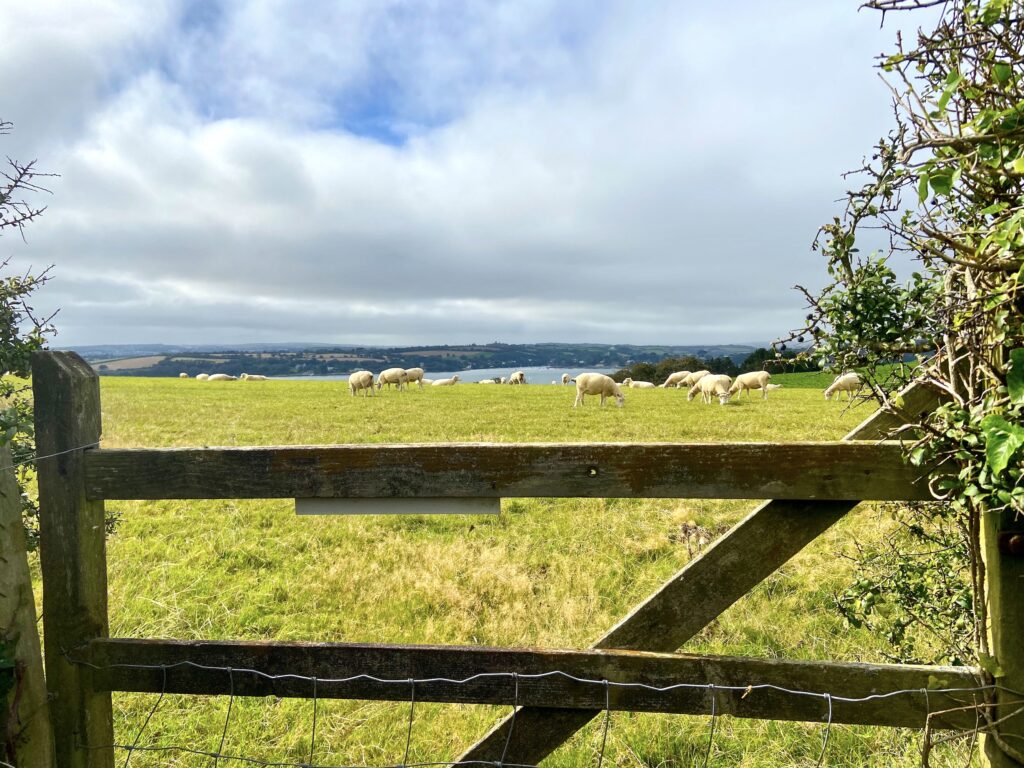
Photo: © F.Hardy.
So here we are on the Roseland Peninsula, immersed in the most beautiful countryside, with a flock of sheep in the foreground grazing on rolling pastures, the river Fal in front of us and the English Channel behind. It’s hard to imagine a place further removed from the cut and thrust of the corporate world. It’s really been a bit of a lifestyle change for you, Michael?
Michael Yes, enormous, actually – probably more so than we ever estimated. But yes we changed from two corporate jobs up in the city and living in the south east down to a very different life down in Cornwall, but so far so good. Yes it takes longer than you think to adapt to it, but we’ve now got more time with the kids, some lovely countryside around us, and great people to get to know where we are now. So, yes, a big change. And I think the fact we’ve got four relatively young children, if we were going to support that lifestyle, we were going to do another 10, 20 years of it. Yes, it was fine, but we just needed a change.
I think what happened was we actually spent a lot of time in the car on a very long journey without the children. And for the first time in a long time, we had time to chat. We went to a friend’s 50th in Wales, spent ages in the car. And I just said: ‘Come on, let’s let’s do this. Actually, you know, why don’t we do it now? The children are just about to start school; they’re young enough; we can make the change without upsetting them too much.’ You can do all the analysis you want, but at the end, you don’t really know what’s going to happen. So we just said, right, come on. So we put the house on the market.
Sarah We got an offer really quickly and that kind of threw us a bit, and we said: ‘It’s meant to be,’ because it was four days. So on the fifth day we accepted an offer on the house and that’s when our life all changed.

The house. Photo: © F.Hardy.
Michael And with a few bumps along the way, we ended up buying what were some converted barns on part of an old farm in Cornwall, on the Roseland. So, you know, there were a few nights, I think when we first landed, we saw the place in June and July. So beautiful, sunny Cornwall. And then we landed in December, so the wind…we had 80 or 90 mile an hour wind whistling over the headland thinking:
‘Yes, what on earth have we done?’ And thinking: ‘How are we going to make money? Will the kids be happy? Should we just have stayed in the beautiful part of the world that we lived in before?’ Which, you know, wasn’t a terrible place by a long way. But I think it was the pull of this place, and I think that’s what it’s got to be – I think it’s got to be a pull, not just ‘I don’t like this life; I want another one.’ You’ve got to be pulled to somewhere. And even though when we saw this place, it was one of those places where we went: ‘It doesn’t really work. There’s not enough bedrooms. The shape and configuration of everything is a bit weird and we can’t get our head around it.’ But we fell in love with it, and the views like we’re looking at now are just astounding.
And we’ve been very lucky because we’ve landed in a place where actually when we bought the place, we were being interviewed as much as we were choosing the house – the people were choosing us as well. So we’ve landed in a place where all our neighbours have been so welcoming and really looked out for us. And I think they have understood the magnitude of the change we’ve made better than we did, perhaps. But they’ve really helped us to land. So, as you can see, we’ve got a fantastic view across the creek to the valley on the other side.

Felice What made you choose Cornwall, of all places?
Michael Well, I’d love to say it was it was a very considered choice. I think the fact that it was a bit further away and a bit different, and the fact that the countryside here is beautiful. And when we moved here, people were saying: ‘Oh, it’s like Cornwall was 50 years ago now.’ It is changing. And it is, as you said Peter, there some big changes going on, but it is far enough away that it’s still quite hard to find somewhere in the UK now that’s different I think, increasingly so. But but this really is different. And the beauty of the beaches, the welcome of the people, and just the pace of life.
Peter Presumably you’re getting the welcome from the people because you’re not coming down three times a year? You were coming to live here with a young family, with really young children and going to local schools and being part of the local community.
Michael Yes, absolutely. I mean, little did they know about our children and maybe what the noise levels were going to be once we’d moved in. And I think we’ve still got some way to go. People have been really welcoming, but we’ve been so busy that we’ve probably got more roots to lay, more work we can do to to embed into the local community.
Felice You told us earlier that there are lots of things for children to do. Lots of activities and things?
Michael Yes, that’s right. And there’s a slightly, dare I say, a bit less of the cotton wool down here. So we took our children out kayaking – there’s a retired teacher who runs a kayaking and stand-up paddle-boarding place around the corner. And he gave our four- year old a kayak and said: ‘Get on with it. Off we go.’ So we’ve had some brilliant fun. And this part, particularly on this south coast of Cornwall, around Carrick Roads and the Percuil River, the waters are relatively calm and very benevolent at times. So you can quite easily go kayaking and stand-up paddle-boarding.
We’ve done loads of walking and just getting out and kids can amuse themselves for hours, as we all know, with a rock pool and a bit of beach. So we’ve been lucky. And this time of year, obviously, September is a lovely time because it’s still warm, the beaches – they haven’t been rammed but they are a lot quieter now –and the kids have just really taken to it. We don’t really have those issues with them sitting in front of their iPads all day; it’s been great. My daughter’s doing a bit more horse riding. The other kids are getting involved in it. The dog just lost huge amounts of weight, with all the walks we’ve been taking him on. So the kids have been very active.
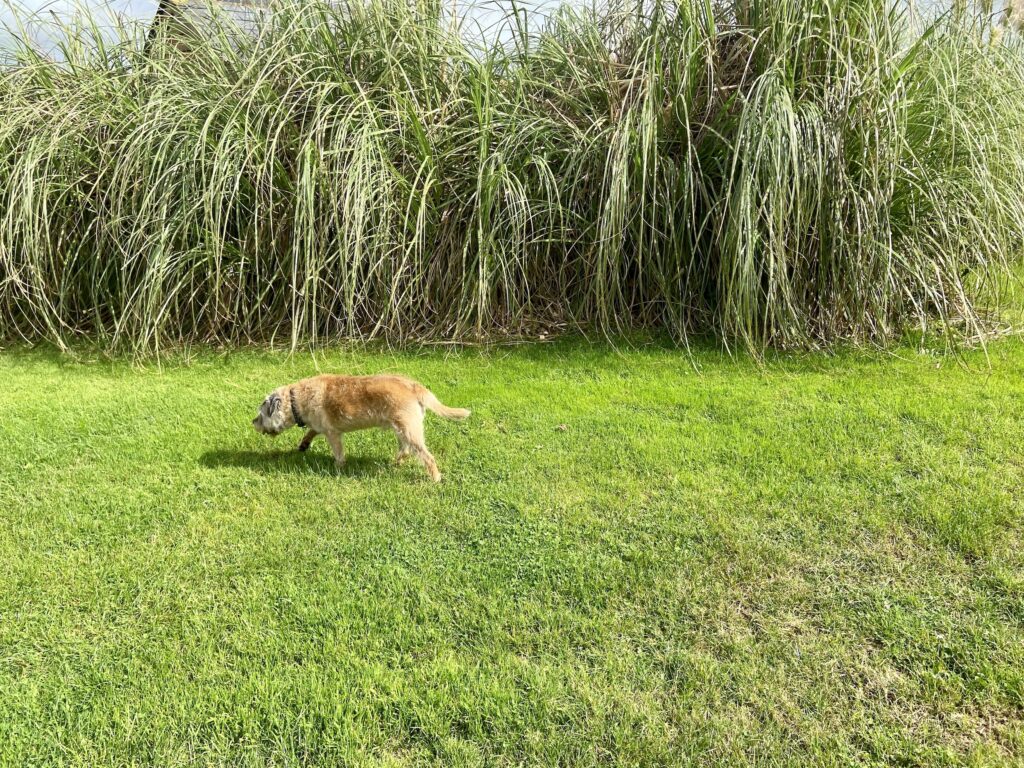
Bertie the dog. Photo: © F.Hardy.
Peter So what have you actually bought here? Where we’re standing in the middle of this glorious field, you’ve got about eight acres you were telling me, and you bought a converted barn?
Michael Yes, that’s right. So originally, this is a dairy farm and we’ve bought what were two cattle barns that were converted about 20 years ago for the farmer. He moved into them and turned a couple of them into holiday cottages. But, yeah, these are the old cattle barns kind of perched halfway up the valley, which were where the calving took place, where the milking took place, where all sorts of stuff happened.
Peter Your rental cottages: how many people do they sleep?
Michael So the larger one sleeps six – the three bed cottage, and the smaller one sleeps four. So we’ve got to two double rooms, a twin in the larger one, and then two doubles in the two-bed cottage. And with lots of space for kids to run around.
Peter And the idea was a modern version of The Good Life – to give up to really heavyweight corporate jobs, leave that all behind, go rural and see what happened?
Michael Yes, exactly. I think we probably were overoptimistic in how quickly we could change things, but that’s exactly it – just live a different life. And to anyone who’s thinking about it, the corporate world in the south east of England, for example, it is always going to be there. So we started to do a bit of that.
We haven’t quite got the livestock yet, but that’s the next thing on the list. But we’ve got the inevitable pony, the kids have got loads of space to run around in, and we’re spending loads more time with the kids, who I never really used to see before. They definitely benefited from that. And actually, their relationship with each other is better because they’re just out doing stuff. I mean, they can spend all day building a den. So we’ve spent in lockdown the best part of six months just with us and them on this, beautiful seven-and-a-half, eight acres with loads of space for them to do what they want. And play in the play-park, go fishing or whatever they want to do.
Peter And a stupid question, has it been difficult to find the tenants for your rentals?
Michael No, is the very simple answer. Cornwall is a beautiful spot anyway and I think we’ve been very pleased with the popularity of what we’ve got here.
Peter And you’re booked up until next year, you tell me?
Michael So we’re fully booked for this year. Next year is probably half -ull already and we’re expecting to be booked up by about December, January. So the next step for us really is to try and grow the holiday cottage business just a little bit, enough to give us the income we need so that so that we can really properly live the lifestyle down here.
Felice So if people want to rent one of your cottages. How do they find out more?
Michael So the best starting point is go to our website, which is www.messackholidays.com and then all the details are on there. At the moment, we use an agent, but you can find all the details on there.
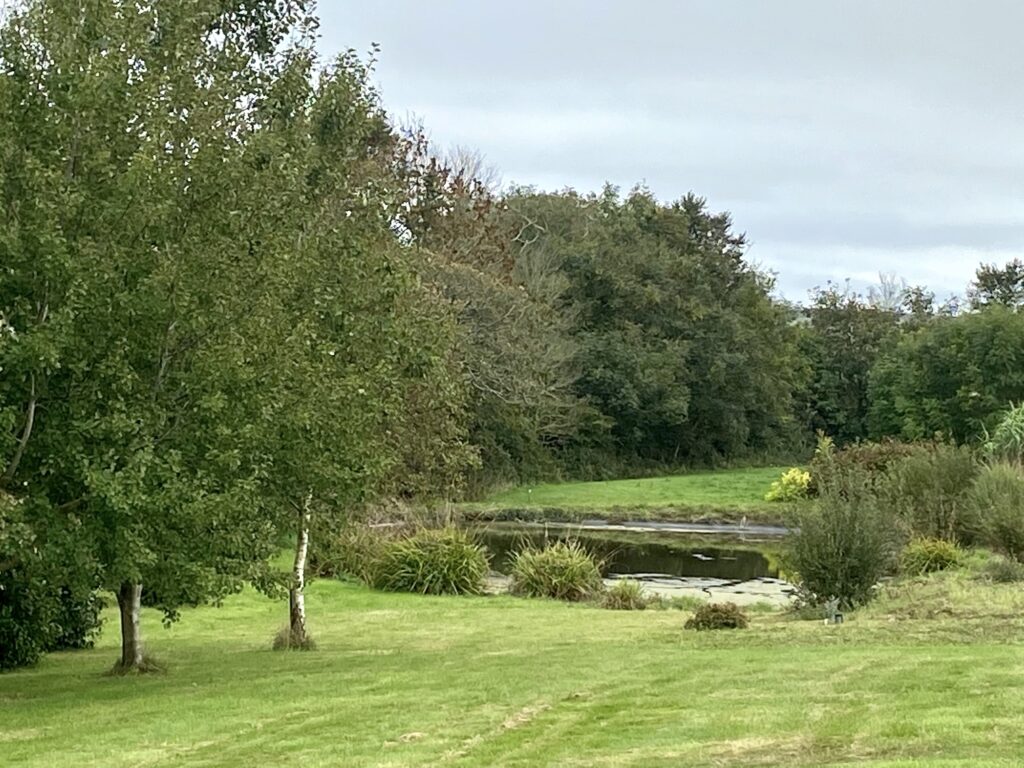
The pond. Photo: © F.Hardy.
Peter So you have a magnificent pond over there.
Michael Yes, it’s great, isn’t it. Actually that’s where the goldfish ended up, so they’ve definitely had a good transition because they’ve got a much bigger place to live. But it’s a mainly wildlife pond, so we get great big dragonflies in the summer and about this time, and we get some moorhens in there and some ducks and geese. Canada geese come in for a little while to spend some time with us, and the kids just love watching. I’ve never seen so many tadpoles, huge amounts of tadpoles and frogs which the kids are collecting and having in various jars and ponds and sinks and sometimes washing up bowls that they collect off there. But we might do some fishing or something with it one day. But at the moment it’s just wildlife.
Peter Then you’ve got a hot tub here on the terrace.
Michael Yes, that’s the one bit of upcountry living that we wanted to bring with us. That’s had a fairly interesting move, but it’s brilliant. I’ve never known beautiful darkness like it out here; no light pollution and the number of stars that you can see is magnificent. So quite a few evenings spent sitting in the hot tub, with a glass of wine and just counting the stars, watching the International Space Station.
Peter And during lockdown, you had magnificent weather?
Michael It was fantastic, that first month or two was amazing. We definitely counted our blessings then, with eight acres and four kids and nothing else to do but play around.
Peter So behind the hot tub is a magnificent tree. Tell us about this tree?
Michael I was something we discovered. It’s a palm tree, a well-established palm tree so I would have thought it’s probably 20 years old or more, and it’s beautiful. And it was covered in ivy and kind of hidden behind everything else, and as part of our work on the garden we uncovered it and knew it was there, but never appreciated just how beautiful it was. And yes, beautiful part of the country that this is, you can grow stuff.
Peter I should explain for our listeners in America that we are in England, good old cold and rainy England, but we do have in this part of this part of England, the Southwest, you actually have quite a lot of subtropical growth.
Michael Yes you do. There are some amazing gardens in Cornwall, historical gardens with really a lot of tropical vegetation. And I think it’s the rainfall, I think it’s partly the soil, the extra three or four degrees of temperature difference, the extra warmth you get down here being on the edge of the Gulf Stream I think, makes quite a difference.
Peter Has it been difficult for the children moving school?
Michael On the whole, no. I mean, the youngest ones were just starting school, so that was not a problem. They were straight into their first years at school, so that was great. Through the eldest one, she had a great friend where we used to live upcountry and but we’ve still managed to keep in touch with that friend of hers. And now she’s got two sets of friends, so actually it’s worked out quite well.
Peter And what about yourselves? Do you feel you’ve cut yourself off from friends?
Michael Yes, a great question, actually, because obviously we’ve been through lockdown as well where everyone is just taken to using Zoom and other means of staying in touch. So yes, there was a bit of an adjustment, but we’ve made friends very easily down here. Obviously, having children helps enormously to get to know local parents and so on. And we’re still in touch. So a bit like the children, really, we’ve now got two sets of friends where we had one. And staying in touch with the other guys has been very easy. So it’s been okay, actually.
Peter But you haven’t actually completely given up the corporate world. I know both of you have been doing a little bit of freelance work as well?
Michael That’s right. We’re halfway through the work we want to do to maybe develop some more cottages. But we’re still having to do some some corporate work and some interim contract work just to keep the money ticking over, kind of as we planned we would. But hopefully, eventually, we’ll slowly wind down on that and then just do it when we want to do some interesting projects, some work that’s different.
Peter Do you feel cut off down here at times?
Michael The first week we were here, I was still working upcountry and my wife phoned me and I said: ‘Look, how are you? It’s the middle of winter, we’ve moved in the middle of a city to know very remote but not isolated part of Cornwall – how do you feel?’ And she just walked back down the lane, which is pitch black. And she said: ‘I don’t feel at all scared or nervous.’
That’s in large part due to the welcome that we received when we were down here, from our neighbours who were just lovely and very conscious of the change we were making and were looking after us. But no, it wasn’t as complicated as we thought. Obviously logistically it’s a bit more tricky to go and get stuff. You don’t just pop around the corner to go and get something from the DIY store. You’ve got to be a bit more planned in what you do, but actually with online deliveries and the way technology has changed, being remote is a thing of the past in the countryside.
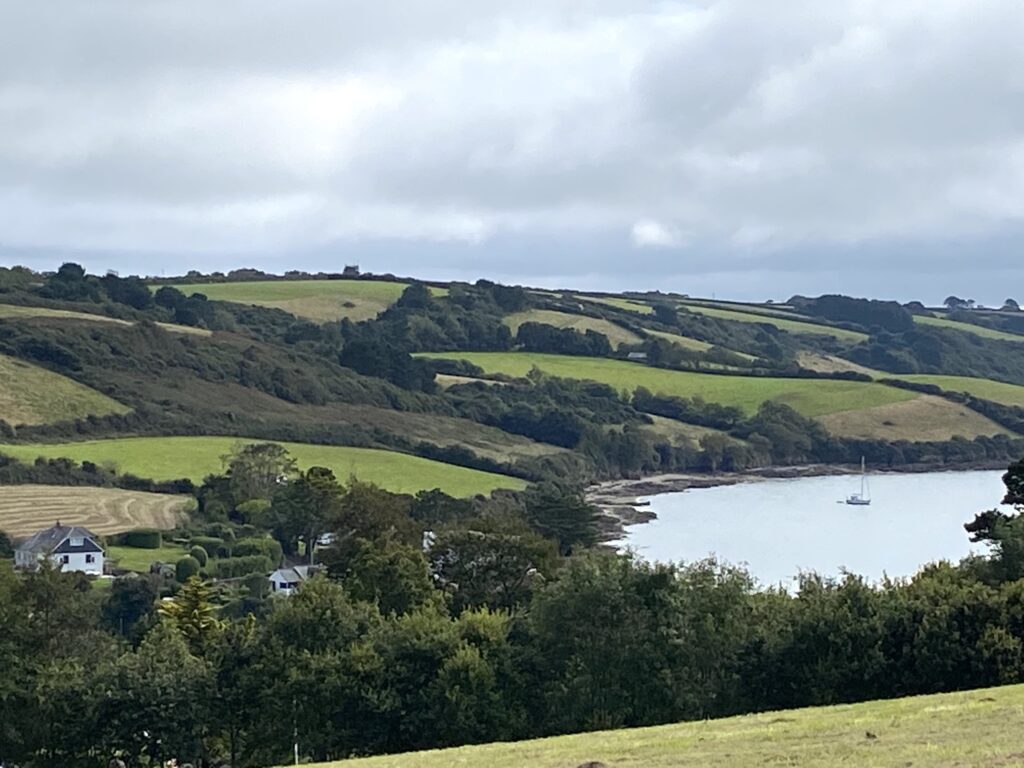
View to the sea. Photo: © F.Hardy.
Peter No regrets?
Michael Not at all.
Sarah No regrets. I think it’s tough in terms of completely new life, but people have been really welcoming down here. And even though we’re not Cornish, we’ve been accepted. And I think with the family, it makes a real difference because travelling as a family and we don’t go anywhere unnoticed.
Peter That I’m sure.
Sarah Unheard, unnoticed, always loading and offloading the car.
Peter So you’ve also built a magnificent playground. How did that come about?
Michael Well, slightly bigger than we envisaged.
Peter I should explain, it’s got a lifeboat in the middle of it. It’s got various ladders and ropes and swings and cargo nets.
Michael Well, as is I think the way in some parts of the world, everything’s by word of mouth. And we just heard that there was an adventure park that was replacing some of its equipment, and that some of this stuff was was available. And so we duly trundled over there to pick up some of this stuff, which of course, in the middle of an adventure park looks fairly small, but when we got it on the back of a truck and tried to get it down the dual carriageway it was a little bit more complicated. But it’s fantastic. We’ve got a great rowing boat thing that’s a sandpit for the kids, a big cargo net, a big climbing frame. And they get their friends over and they’ll spend hours on it. So again, a bit of therapy for the parents as well.
Peter And a lot less screen time for the kids.
Michael A lot less. And in fact, it’s almost something we use now as something to educate or distract them in a different way. But they will spend most of their time outside when they can. Obviously, the weather turns and you’ve got to think of other things.
Peter It’s quiet here, isn’t it?
Michael It is very quiet, almost totally silent sometimes with literally just the sound of the birds and the bees, as it were. And you underestimate just how much background noise there can be in a city. And again, I think our first few nights here, we were slightly spooked by the lack of noise, but now it’s fantastic. And we do find, when we go up to the Big Smoke, just how noisy it can be up there. But you can hear things right across the valley because there’s literally no other noise.
The first few months I think were challenging, with us having lots of doubts about whether we’ve done the right thing. But now everything settles down as it always does. You’ve just got to keep hold of your dream and keep sticking to it and believing in it. And I know it’s cliched, but you do and you will slowly build it, and you’ll get to it. And then, once you’ve built your dream, like everyone, we’ll go: ‘Right. I want to do something else now.’ But I think that’s what you’ve got to do: just keep going and you will slowly, bit by bit, build the blocks you need to make that dream a reality. So, yes, we are halfway there, I think.
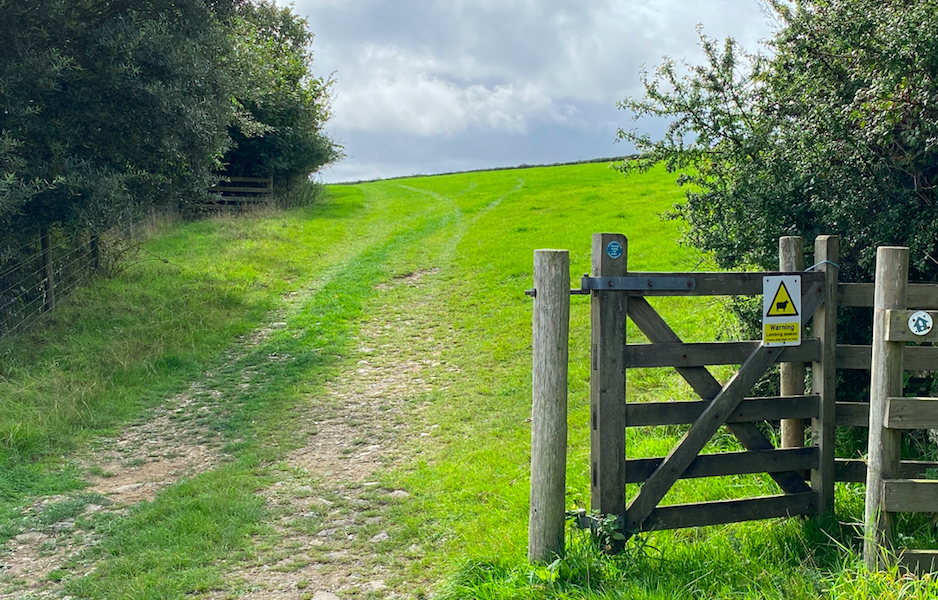
Photo: © F.Hardy.
So this is the lane we own – actually, we don’t own it, we have the responsibility for it. It’s a slightly different way of looking at what you own and don’t own. And it’s one of the changes of mindset we’ve noticed in ourselves while we’re down here. You know, we were chatting to one of our neighbours, and because this was a farm that was held for several generations by one family, you do very much feel like – yes in theory, legally it’s your property and your title – but you do very much feel like a custodian of it. And in a way that you never would have felt in any other house we’ve owned before. It’s probably obvious to people who live in the country and farmers that you’re just looking after this for a very short period of time for the next people, and you’re looking after the countryside. But I think we appreciate that more than we that we ever did, that you’re just a custodian of it for a period of time and you’ve got to look after it.
This lane is about a quarter mile long and it just takes us up to the headland, which looks out across to Fal mouth actually, and the Atlantic, and out to the estuary where the Fal meets the English Channel and ultimately the Atlantic Ocean. But it’s great because you are in a very rural location, but Falmouth is a few miles away, Truro is a few miles away. There’s all the events associated with sailing and Falmouth and the history of that city.
And then fascinatingly, it’s not just the leisure kind of activities and leisure boats that you see out here. You get jack up rigs, cruise ships, there’s a ferry that crosses the river Fal, there’s two great big cargo car container ships moored up there. So it’s not just a pretty tourist spot; it’s actually a working docks and in Falmouth some fairly hefty industrial and commercial activity, which I find just as interesting as the natural stuff.
There are two castles on the entrance of Fal estuary – Pendennis and St Mawes you’ll see it coming into view as you go around the corner, then Pendennis Castle, and some lovely views out towards the Lizard, which is the most southerly point in the UK, and the mouth of the river Fal in the estuary. So there’s always something interesting going on out there. And then you have a lovely, beautiful little village – we’re about a couple of miles away from the nearest village. People are always water-skiing out here or jet skiing, so there’s always something interesting going on and some beautiful land that’s now owned by the National Trust. And you can see this is where the path, the National Trust path goes across. It goes all the way around the headland…some beautiful houses as well overlooking the coastline.
Felice To get to your house, we had to take a ferry for the last bit.
Michael Yes, that’s right.
Felice That cuts it off even more, makes it more individual and different?
Michael Yes that’s right. So it feels kind of like an island, even though it’s really just the headland. But there are five chain-link ferries in the UK – in theory, they’re not even a ferry but actually a floating bridge, so it doesn’t qualify as a vessel. But there are five of these chain-link ferries which basically pull themselves from one side of the river to the other using these enormous chains and great big cogs. That’ll take 20, 30 cars and that’s our essential link to getting across to school, to Truro and Falmouth. And it’s actually a lovely way to get to the school every morning. And we’ve seen things like dolphins and all the other wildlife that occasionally pop up in the river there. So the kids don’t quite realise maybe how lucky they are going on the ferry every morning to school.
We’ve just had superfast broadband installed, it’s quite feasible now to work from here, my wife’s just done a year of contracting without meeting the team she’s working with – all via Zoom and superfast broadband. So I think it’s becoming more feasible to do this in a way it wasn’t.
Peter Well, I think there’s a rush to move out of cities and do what you’re doing. But you had a two-year start.
Michael We did. As luck rather than judgment I think, we’ve we’ve landed on our feet…definitely. But there are still a few places around Cornwall, which are still a bit more remote and perhaps like Cornwall as it was 30, 40, 50 years ago. And to date this area has been relatively untouched, partly because it’s an area of outstanding natural beauty so there are fairly restrictive planning guidelines.
But also actually, I was saying I think we were as much chosen to move into those place as we chose it. And the community here is very strong still, and it’s a community like I’ve never known before: very informal but a very strong community. And that’s helped keep a sense of identity here that perhaps has been lost elsewhere.
Peter So do you and Sarah, do you feel you’ve found a new identity for yourselves in making this move?
Michael It’s changing, it’s definitely changing. I think you could definitely have put us into the kind of standard corporate mould, corporate jobs, commuting. Yes, maybe slightly more than two point two kids, but we have definitely changed already. You know, a different way of looking at the world, different way of thinking about the things we own, and the way we bring our kids up. I think it will take a little bit longer for that change to take effect. But we’ll never be Cornish, but there’s a little bit of Cornish in us already, I think.
Peter Now, you’ve had a wonderful summer and autumn is upon us. Are you going to run the cottages during the winter?
Michael We won’t this year, because we need to do a bit more contracting work to get the money we need to do what we want to do next. And actually, there are some challenges in running the cottages through the winter. If the weather’s bad, people are going to be indoors all the time, so it puts extra strain on the cottages, got heating bills to think about.
So one of the things I’d love to do and we are going to do is convert ourselves from the oil-based heating system we’ve got at the moment to a more sustainable system. So a ground source or an air source heat pump, which will be fantastic because we not only lose the cost of the oil, but we’ll have hardly any running costs for our heating and hot water…and the government will also pay you for it, so that’s quite attractive at the moment.
But I think in the future, when we make some more changes, we may well open them up because, as you were saying, there’s definitely something quite exciting about being in this part of the world in the middle of winter when the storms are raging or having a windy walk on the beach. – there’s some great stuff there. But for the moment, I think we’re full on enough with the four kids and a bit of contracting work. So in due course probably. And we’ve got the hot tubs as well, so actually sitting out in those in winter is quite attractive. So we might do it in the future. So hot tub, wi-fi, dog-friendly, child-friendly, those kinds of things were essentials for us to getting the level of bookings that we are achieving so far.
It was quite hectic when we landed. We were delayed with our house purchase, so we had a lot to do to renovate the cottages in a shorter time than we’d originally envisaged. My budget was optimistic, let’s say, for the renovation of the cottages and the standards that I was planning to do them to were perhaps a little bit different from where my wife, quite correctly, had set her standards. But that was a good thing.
We did overspend on the budget, but actually we get great feedback, we’ve had perfect feedback on the cottages and people are having a great holiday, which is really important to us. Genuinely as well, it is really rewarding when people have had a fantastic holiday, when you’ve put in all that effort to make the cottages the way they are and then people come down and have a brilliant time, it’s a really nice feeling.
And the other aspect, which I wasn’t sure what it would be like, has been meeting people from…we’ve had guests from overseas, but our guests at the moment are primarily from the UK because we advertise primarily through UK-based agency.
Peter But not many people can come here at the moment.
Michael Not many people, unfortunately, can come here and enjoy this beautiful part of Cornwall from overseas. But when it does open up again that might change, but it’s just been great. The UK is a very rich and diverse country in terms of the people that we have here, and you get to meet many more people in a lovely environment: they’re on holiday. So that’s been really rewarding.
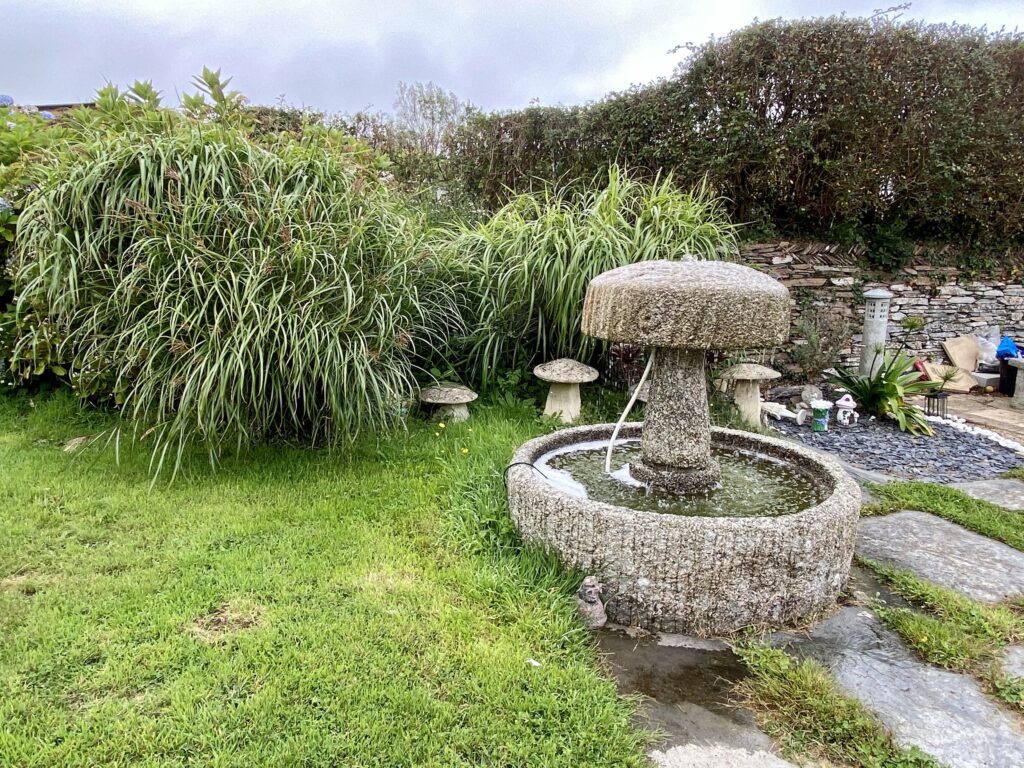
The apple press. Photo: © F.Hardy.
Peter Here on the edge of the terrace we’ve got a magnificent fountain, which looks like a kind of mushroom. Whatever is it?
Michael Well, we thought the same, actually. But it’s the old apple press from the farm which was used…goodness knows how old it is. So it’s granite, it’s got a granite bowl. And if you imagine the mushroom turned upside down, what was the head of the mushroom was actually the weight that would turn around in the bowl of the granite here. And you would pour apples in from the orchard and then the stalk of the mushroom, which is then up in the air, had a big wooden pole attached to it and would be turned by horses or donkeys, which would crush the apples. So it’s an old apple press, which of course would be used to make cider, which we’re very fond of.
Peter And they’re very strong on scrumpy in this part of the world.
Michael Very cloudy, very strong scrumpy.
Felice And did you convert it yourself when you came here?
Michael No, the farmer that we bought the barns off had obviously seen it in use. I think probably half the fact that it had very fond memories for them. But I think the other factor is it probably weighs well over a tonne, I would imagine. So moving it probably wasn’t that easy, but they converted it to this lovely fountain.
Peter Kind of hazy and cloudy memories, I expect.
Michael Yes, you wouldn’t want to move that after a few pints of scrumpy.
Felice So overall, the move, the change of lifestyle, has it been a real success?
Sarah Yes, it has. And I think, when we came here, I can only describe a peacefulness I felt when I came on site here and I walked around the garden – we’ve got a lot of space here and I just felt very peaceful. When Mike was initially working away, I never felt vulnerable or threatened here at all. I was on my own with the children in the middle of nowhere, but I felt very at peace with what we’ve done, our decision and more.
Peter Sarah and Michael, thank you both for sharing your life-changing experience with us, and we wish you and the children the very best here in the tranquil Cornish countryside.
Felice That’s all for now. If you’ve enjoyed the show, please share this episode with at least one other person! Do also subscribe on Spotify, i-Tunes, Stitcher, or any of the many podcast providers – where you can give us a rating. You can also find us on Twitter, Facebook and Instagram. Stay safe and we’ll see you next week.
© ActionPacked Travel
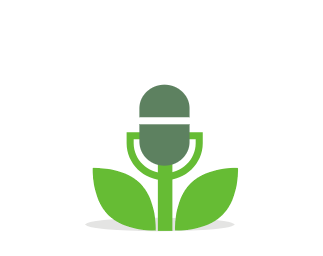
- Join over a hundred thousand podcasters already using Buzzsprout to get their message out to the world.
- Following the link lets Buzzsprout know we sent you, gets you a $20 Amazon gift card if you sign up for a paid plan, and helps support our show.
